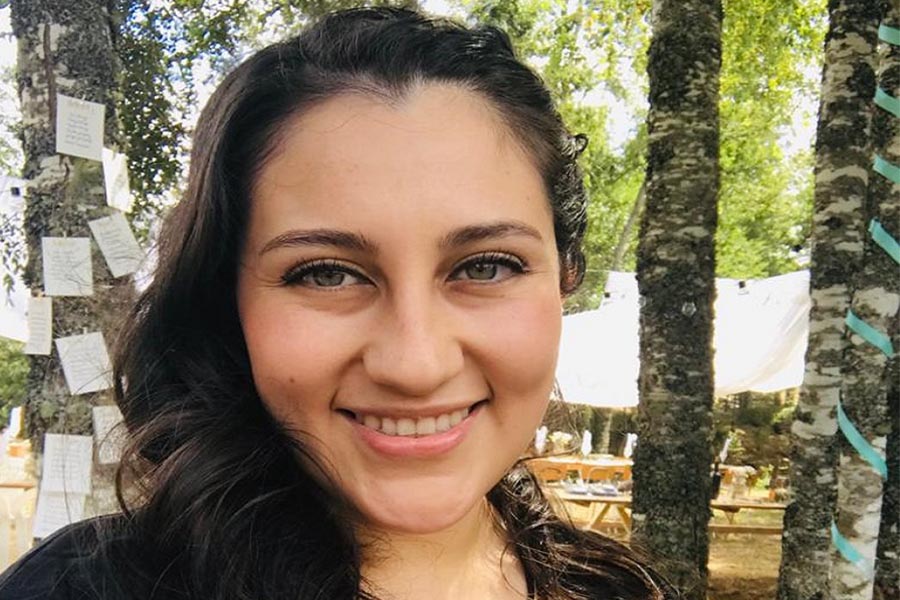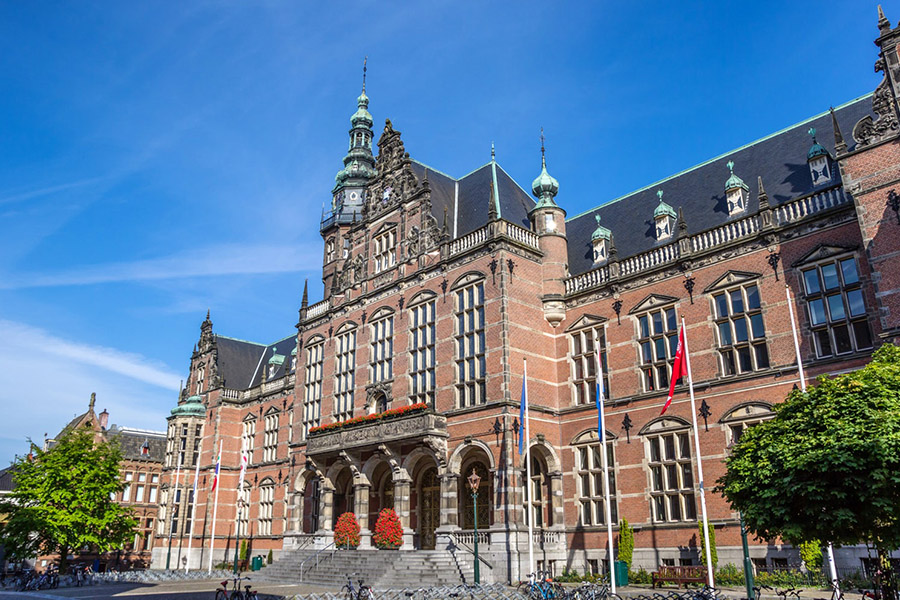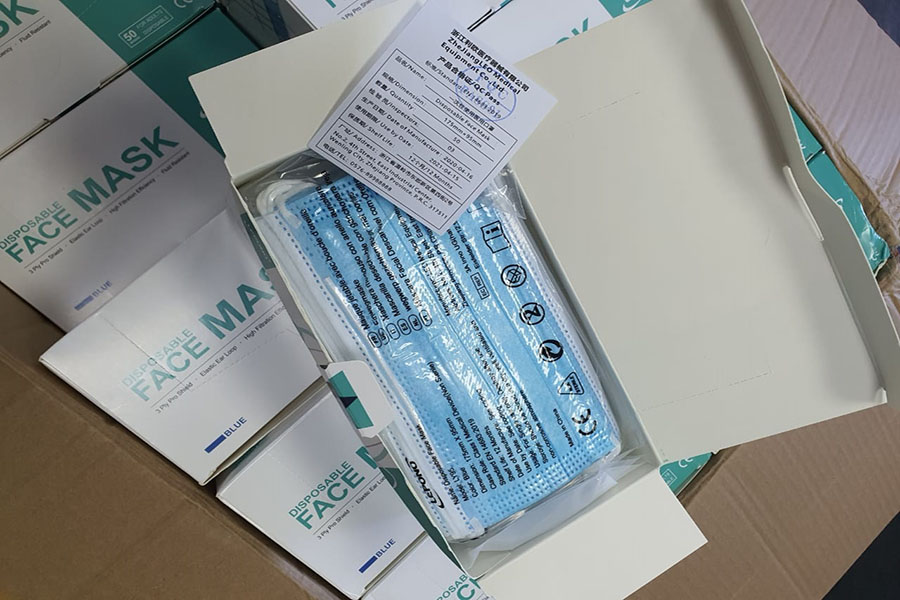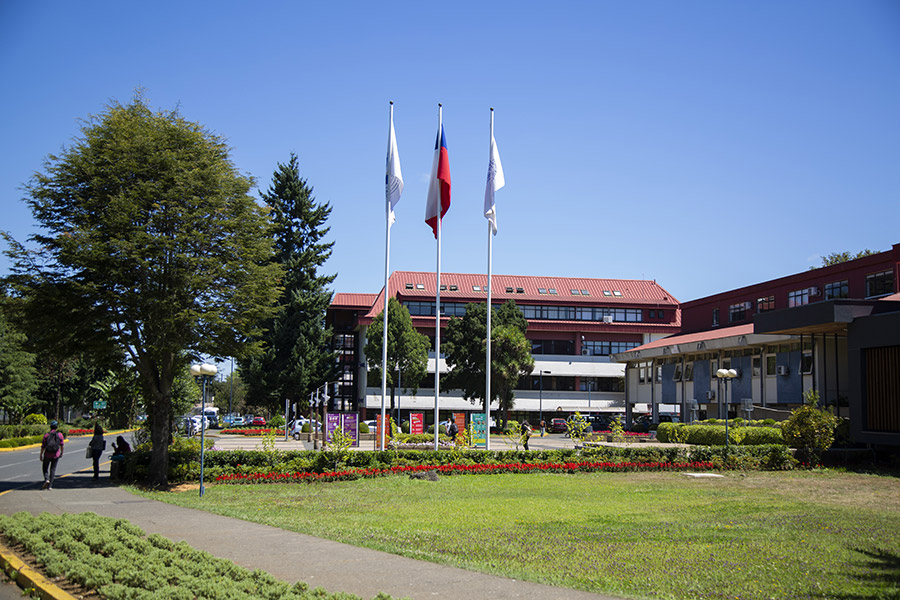|
Bárbara Mora’s thesis presented the results of a new potential alternative, based on the mixture of two drugs, which could generate positive effects in treatments for this pathology. |
Gastric cancer is the second main cause of death by cancer in the Chilean population and the leading cause of death by cancer in men, what makes it an important problem in public health. This is what reports from the International Association of Cancer Registries reveal, trying to improve survival rates and to reduce adverse effects. Cisplatin is one of the most used chemotherapy medications, although the main problem of this treatment method is drug resistance. The identification of new differentially expressed genes associated to the development of cisplatin-resistant phenotypes in gastric cancer cell lines was the main objective of the research and thesis carried out by Bárbara Mora, with which she obtained her doctoral degree in Science with specialization in Applied Cellular and Molecular Biology from the university Universidad de La Frontera (UFRO). Within the research, Dr. Mora generated a model of resistance to cisplatin in gastric cancer cell lines, to later characterize and perform an RNA-seq analysis to determine the genes and signaling pathways of interest, meaning those involved in the resistance phenotype. The research was carried out under the supervision of Dr. Priscilla Brebi (guiding teacher) and Dr. Carmen Ili (co-guiding teacher) at the Laboratory of Integrative Biology (LIBi), CEMT-BIOREN, of UFRO. Bárbara Mora is a biotechnologist who graduated from UFRO and enrolled in the Ph.D. program in 2015. During her Ph.D. studies, she achieved 5 ISI publications, 2 non-ISI publications and submitted 1 paper. In addition, she actively participated in 8 international and 13 national congresses. “I chose this program, because I wanted to do research in my region. Besides, the program did offer the field of research I wanted to work in and the academic body I wanted to work with. I had to make constant sacrifices for 5 years and I learned to overcome my frustrations, because in science, most of the time the experiments do not work out as you thought. But everything is possible when you have such a great team standing behind you,” Dr. Mora concluded.
Written by: UFRO Communications Office |
|
The UFRO Ph.D. program has students who are studying a Joint Degree at the University of Groningen in the Netherlands, as well as at the Sapienza University of Rome in Italy, in addition to Cotutelles with professors from European and Latin American universities. |
Joint Degree agreements and Cotutelle programs with institutions from Europe and Latin America are only some of the actions of internationalization the Doctoral Program in Communication, which is imparted by the universities Universidad de La Frontera (UFRO) and Universidad Austral de Chile, carried out. One of these agreements has been signed with the renowned University of Groningen in the Netherlands. Five Ph.D. students of UFRO are currently studying within this Joint Degree program, thus opening up new opportunities for networking and academic exchange. Dr. Carlos del Valle is the director of the program and explained that this Joint Degree agreement in particular originates from the network of researchers he is part of, as a researcher of a Horizon 2020 MSCA-RISE project, financed by the European Union. “The framework agreement was initiated in 2016 and at the end of 2019, we signed the first specific agreement for the double graduation of a student. Four other students are also in the signing process at the moment, so that 20 percent of the Ph.D. students will be able to acquire their degree from UFRO and the University of Groningen at the same time.” Eduardo Gallegos knows these requirements very well, because he is one of the Ph.D. students who joined this Joint Degree program, and the first one to carry out his doctoral stay at the University of Groningen. “I was able to make contact with some of the teachers there since I started my Ph.D. studies, and I also took an elective class, which was taught in Temuco, by a teacher from Groningen. All of that allowed me to approach the professors, to ask them some questions and to start my doctoral thesis outline, which is about the stories of European travelers in Chile and their connections with the nineteenth-century press in our country,” he commented. His stay at the European university was part of the program. He went there in February and came back at the end of May this year, using the time to progress with the outline of the remaining work and to define the details of his research proposal with the professors in Groningen. “Although the pandemic has slowed down all the academic processes in the Netherlands, it still was a great experience to be there, and this way, the agreement still is fully active and will be useful for different academic purposes of the doctoral program. And also the fact that I had to put my English language skills to the test both orally and in writing certainly was a benefit for myself.” SAPIENZA UNIVERSITY OF ROME Another Joint Degree agreement has been signed in 2019 with the Sapienza University of Rome in Italy, a renowned university with a long tradition. The framework agreement has been signed in 2018 and a year later, the Joint Degree agreement has been signed, with the Italian student Daniele Panaroni being the first one who joined the Doctoral Program in Communication, Social Research and Marketing within this agreement. Regarding his motivation for choosing the Joint Degree program, the Italian student commented that he was interested in improving his work and research experience in the field of ethnic minorities, which is linked to the Mapuche People in the Araucanía Region. “I was supposed to go to Chile in April 2020, but because of the health crisis caused by Covid-19 I wasn’t able to go there. However, thanks to the Internet I was able to participate in all activities and I am very satisfied with that,” commented the student, who is working with Dr. Carlos del Valle on the relationship between new media and the self-representation of ethnic minorities. COTUTELLE Thirteen students of the UFRO Doctorate in Communication are working on their theses in Cotutelle. Among the universities that have a Cotutelle agreement with UFRO are: University of Seville (Spain), Federal University of Rio de Janeiro (Brazil), National University of La Plata (Argentina), Pompeu Fabra University (Spain), Sapienza University of Rome (Italy), National University of Cuyo (Argentina), National University of Quilmes (Argentina), and Central American University (El Salvador). Finally, Dr. Carlos del Valle emphasized that the promotion of this kind of networks and agreements is part of the process of internationalization for this doctoral program. Besides, it gives new options to the students, of which 10 have a scholarship from the National Research and Development Agency (ANID) in Chile. Actually, this fact also confirms the quality of the doctoral program, considering how difficult it is to get one of these scholarships.
Written by: UFRO Communications Office |
|
This gesture is based on the promising collaboration between the two universities, which are already working on initiatives of exchange for the time after the pandemic. |
The fruitful partnership was celebrated last year, when a delegation from the Chinese Zhejiang University of Science and Technology visited Chile and the Araucanía Region to sign a Cooperation Agreement with the Universidad de La Frontera (UFRO). The meeting allowed to strengthen the partnership, through conversations between Fengmin Wu, the chair; academic representatives; Xu Bu, the ambassador of the People's Republic of China in Chile; Eduardo Hebel, the rector of UFRO; and several vice-rectors, deans and directors of the UFRO nuclei. Now, the Chinese university sent a donation to UFRO, consisting of one thousand face masks, in order to contribute to the prevention of the spread of coronavirus. In this regard, the rector of UFRO, Eduardo Hebel, has shown his appreciation in a letter: “The difficult moments the world is facing due to COVID-19 do also have an impact on Chile and our city. However, little by little, we are making progress and the city of Temuco is slowly starting with the different phases of deconfinement.” The use of a mask is extremely important, warns Dr. Hebel, “and this donation is a significant contribution, thanks to which our employees are going to be able to carry out their work safely, and complying with the safety and health protocols established by the authorities”. In fact, the masks were handed over to the Risk Prevention Unit at UFRO, which has been working voluntarily in accordance with the safety regulations since the first case of Covid-19 was found in Temuco. Dr. Lorena Vieli, the director of the International Affairs Office at UFRO, highly appreciates this gesture of the Chinese Zhejiang University of Science and Technology, because “this donation reflects our solid partnership with this university and we hope that we are soon going to be able to award two scholarships for graduate students, offered by Zhejiang University”. Written by: UFRO Communications Office |
|
Three months ago, the online course “Basic English for Tourism” started. The Unit for Continuing Education of Pucón Campus of the university Universidad de La Frontera (UFRO) came up with this online training initiative and the objective of it is to provide tools during this pandemic for the reactivation of the tourism industry in the Araucanía Region when this global health crisis is over. The courses are completely free of charge and designed for entrepreneurs and people working in the tourism industry. Boris Mutizabal, a teacher at the Pucón Campus of UFRO, has prepared the classes and the first course, in which the students learned through didactic contents and practical sessions that encouraged them to interact with each other, finished on August 12. This first course had 17 participants, divided into two groups. The course included two one-hour classes per week and different activities and tests on the platform Google Class, in order to achieve a fluid conversation with English-speaking tourists and for being able to sell their services online or in person, as well as to do outdoor activities with English-speaking tourists and to guide them. Written by: UFRO Pucón Campus
|
|
Workshops for teacher development, virtual support services, platforms with specific information and online resources for remote learning are part of the offer at UFRO, in which the university’s academic staff is participating. |
The current pandemic is causing transformations in higher education. It is a time of complex challenges, which has led the university Universidad de La Frontera (UFRO) to carry out the first semester of 2020 online and to change to remote work. Therefore, the university community started to prepare themselves through the offer of workshops and courses and to learn and improve the required skills and strategies in order to carry out this task successfully. More than 30 workshops for the teaching staff of the faculties were carried out in order to support the positive development of the remote teaching and learning experience. The Vice-rector for Undergraduate Affairs has led the transition, by connecting this reality with the knowledge of national and foreign peers, implementing possible aspects of distance education, supporting the academic staff and providing them with the proper tools. The university also developed psychological and academic support measures for the students, with the help of the Office of Comprehensive Training and Employability. “We have also taken on the responsibility of supporting the implementation of remote teaching at our university by incorporating various strategies. We are working with groups and individually, with the faculties and their teachers, and we will continue with our support through more and new initiatives that will be oriented towards the prioritization of learning results, contents, methodological and assessment strategies, within the context of a pandemic,” explains Solange Martínez, the director of the Office of Curricular and Teacher Development. WORKSHOPS FOR THE FACULTIES AND PUCÓN CAMPUS “There are several ways to carry out different asynchronous activities, and we have been able to show that, in order to make an optimal use of the resources and tools available. It has been a challenging time, but we have been working with a lot of dedication and commitment,” says Pamela Coronado, the advisor and facilitator of the UFRO Office of Teaching Development and Methodological Innovation. The university recently carried out a series of workshops in different fields through the Virtual Campus platform. The responsible units for these workshops were the Faculty of Agricultural and Forestry Sciences, the Faculty of Law and Business, the Faculty of Medicine and the Pucón Campus of UFRO. For Soledad Morales, an academic staff member of the Faculty of Law and Business, the training sessions have been a success, “not only because of the support or help in the field of virtual teaching, but also because they gave us the feeling that we are not alone in this as a teacher. We were able to express our mayor concerns and to solve different issues. They have really adapted to the requirements of online teaching”. Dr. Claudia Barchiesi of the Faculty of Agricultural and Forestry Sciences adds that the support was essential, especially for the academic staff that was not really used to and prepared for this kind of teaching. “In my case, besides the instructions on how to use the Virtual Campus, which I really appreciate, it is the continuous support for the development of learning strategies or appropriate methodologies and instruments for assessment, which really help me and which I am grateful for,” she explains. For the majority of the academic staff at UFRO, this series of initiatives to promote and strengthen remote teaching and learning during this online semester, provide essential insights and guidance and will always be remembered as part of the university experience during this pandemic that has changed our lives. The teacher Hugo Sanhueza admits that he once thought that technology (digital resources) was only something supplementary. “Thanks to the health crisis, I now think different about that, so I started to improve my skills and to adapt, and I’m very grateful for the effort and commitment of the University in order to support us. The process has been challenging and I think that we need to motivate our students even more. That’s the way I have tried to teach the subject of Administration and Functioning of Public Management,” he comments. In addition to the workshops for academic staff, UFRO has created spaces for the exchange of experiences with national and foreign experts to obtain some guidelines for distance education; recommendations on aspects of methodology and assessment have been implemented; and a platform for information and feedback has been designed (docenciavirtual.ufro.cl). At the same time, the Academic Council has included additional regulations for being able to derogate from the application of the UFRO Undergraduate Regulations, considering the extraordinary circumstances of this semester.
Written by: UFRO Communications Office
|










